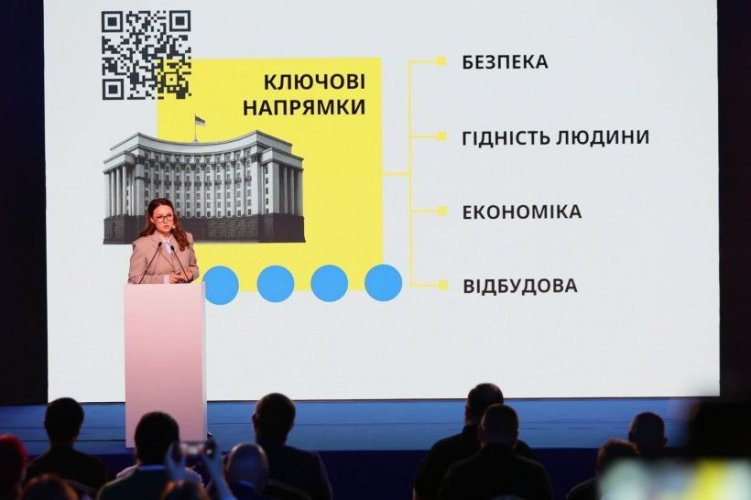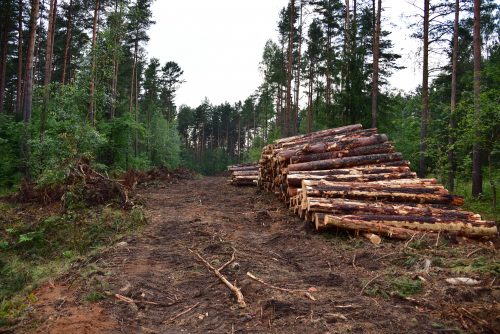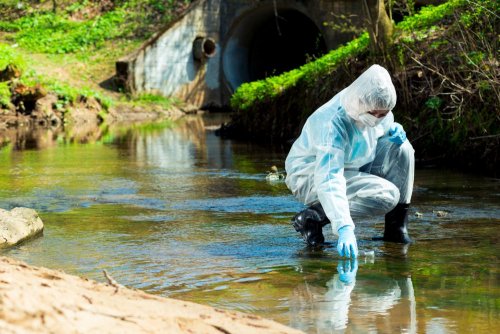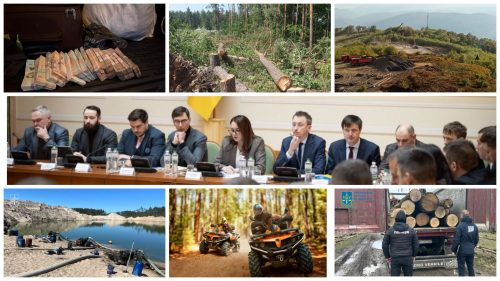On August 18, Ukrainian Prime Minister Yulia Svyrydenko presented the draft Action Program of the government. It contains proposals on key policy areas of the Cabinet of Ministers of Ukraine. EcoPolitics decided to find out how much attention officials paid to environmental issues in the Program.
Presentations of this document and the government's strategic initiatives are available on a special separate website. The public was given only a week to submit proposals for the government's Action Program.
It is worth noting that the Ministry of Economy, Environment, and Agriculture's website contains no mention of environmental protection in its announcement of this document. The entire text focuses exclusively on attracting investment and simplifying life for businesses.
Attention to environmental protection – on a residual basis
First, let's take a look at the presentation. The priorities of the Ministry of Economy are presented on three pages. We have highlighted those that directly relate to environmental protection or may have a significant impact on it.
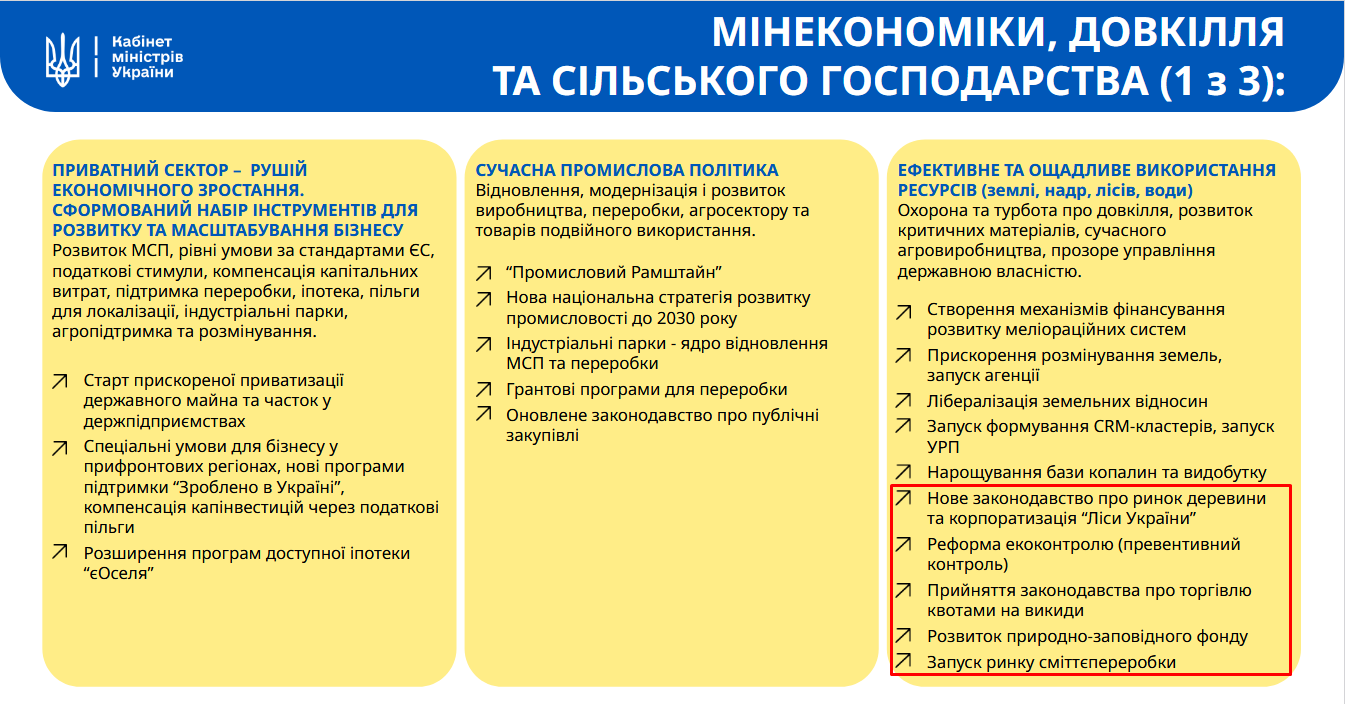
Source: priorities.gov.ua.
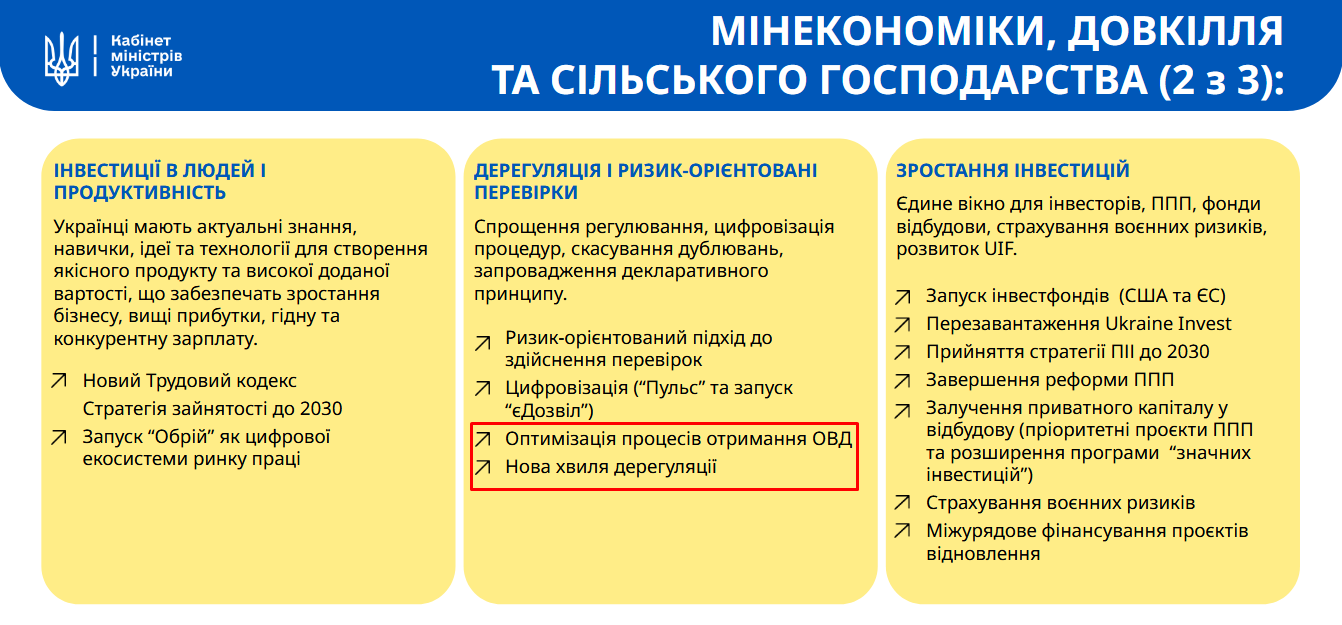
Source: priorities.gov.ua.
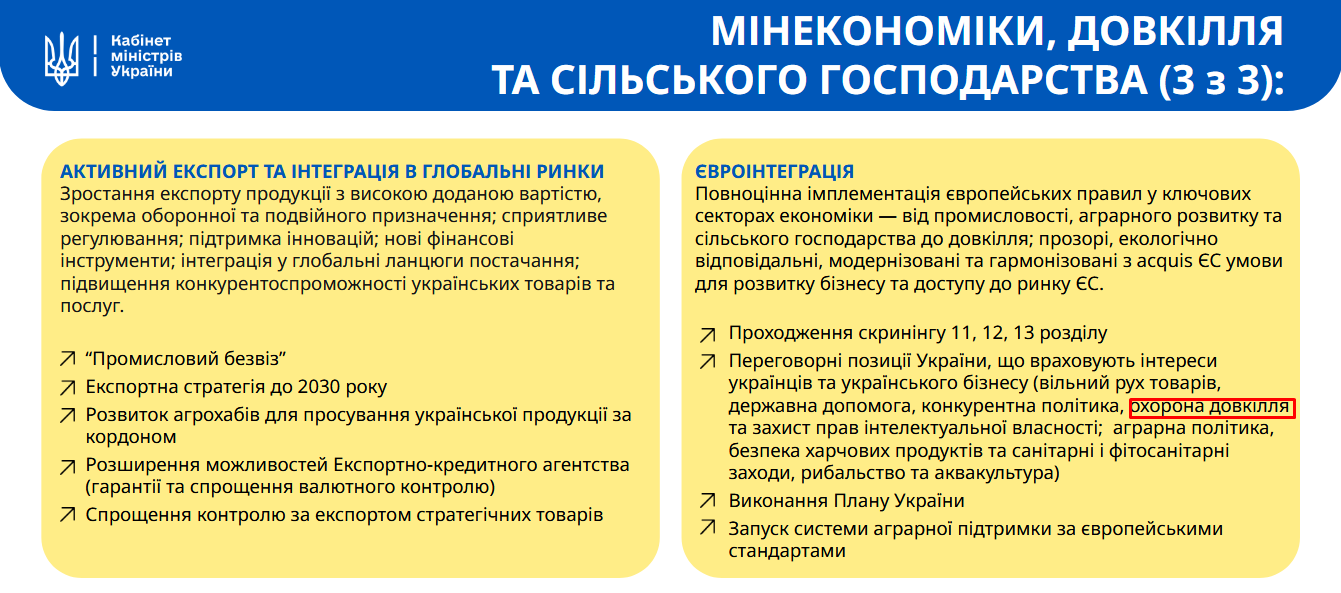
Source: priorities.gov.ua.
In other words, we can conclude that environmental issues are given residual attention in the newly created agency.
Economic recovery is the priority, so the fight against environmental violations and corruption will have to wait
For more details, let's take a look at the text of the draft “Government Action Program (Government Strategic Initiatives)”. It first defines the operational goals and criteria for achieving them in 2025 and 2026 for each ministry, and then presents a draft of measures for 2025 for each of the goals in a table.
Strategic goals
Among the eight operational goals of the Ministry of Economy specified in the draft Government Action Program, only one is dedicated to environmental issues. This is operational goal No. 4, which is formulated as follows: “Ukraine uses its own resources sparingly and efficiently, with care for the environment and the opportunities of future generations.” It declares Ukraine's commitment to developing a policy of economic and efficient use of natural resources – land, subsoil, forests, and water. We are promised that the government will combine “the development of critical materials, modern agricultural production, and transparent management of state property with care for the environment and sustainable use of natural capital.”
To this end, 19 criteria for achieving this goal in 2025-2026 are specified. Only five of them relate to environmental protection. The Ministry of Economy plans to:
- By October 31, submit to the Verkhovna Rada of Ukraine a draft law on the specifics of managing the territories and objects of the nature reserve fund and creating the infrastructure for managing the nature reserve fund of Ukraine.
- By the end of the year, submit to parliament a draft law on the greenhouse gas emissions trading system in Ukraine.
- Implement the transition to a preventive environmental control system, reduce inspections for businesses, in particular by reforming the State Environmental Inspection.
- Work on creating infrastructure for the processing of household waste.
- Promote the adoption by the Verkhovna Rada of the draft law “On the Timber Market.”
The environment is also mentioned in passing in operational goal No. 8, “European integration is our strategic choice.” The government promises to ensure the full implementation of European rules in key sectors of the economy — from industry and agriculture to the environment — and that the conditions for business development and access to the EU market will become transparent, environmentally responsible, modernized, and harmonized with the EU acquis.
To achieve its strategic goals, the Ministry of Economy also plans to take steps by the end of the year that could significantly affect the state of the environment:
- Submit a draft law to the Verkhovna Rada of Ukraine on simplifying the procedure for assessing environmental impact. Environmentalists and activists are constantly warning officials against such a decision, as it contradicts European trends and will open up opportunities for the implementation of projects that are openly harmful to the environment.
- Conduct another wave of deregulation: review and abolish excessive requirements for businesses, optimize licensing and approval procedures. Such simplification also potentially carries risks for uncontrolled exploitation of the environment.
Key measures
Below, in the draft Government Action Program, we present a list of the main tasks of the Ministry of Economy for 2025. Looking ahead, we can say right away that the ministry has planned work that has already been done by the Ministry of Environmental Protection and Natural Resources of Ukraine.
The list is as follows:
- Development of land reclamation infrastructure.
- Improvement and digitization of fisheries management.
- Development of mine action activities.
- Allocation of funds to farmers for the restoration of agricultural production.
- Introduction of a system for monitoring soil fertility and pollution levels. It is planned to approve a methodology for soil sampling on land affected by hostilities, as well as to introduce monitoring on such land.
- Development of the institution of environmental inspectors and updating of legislation on the nature reserve fund (NRF). The ministry wants to implement a pilot project that will introduce new forms of environmental control: patrolling, raids, and rapid (round-the-clock) response to calls. In addition, it is proposed to prepare and submit to the Cabinet of Ministers a draft law on the specifics of managing NPF territories and objects and creating an infrastructure for managing Ukraine's nature reserve fund. In March, the Ministry of Environment already published its draft law “On Amendments to the Law of Ukraine ”On the Nature Reserve Fund of Ukraine“ regarding improving the efficiency of creating and managing territories and objects of the nature reserve fund.” We'll see if the bill prepared by the Ministry of Economy will be different from it, or if the ministry will just use the work of its predecessors and pass it off as its own.
- Creating transparent and investment-friendly conditions for the domestic extractive sector.
- Launching geological exploration using public funds.
- Separation of commercial activities and public social responsibilities in the public sector of the economy.
- Development of CRM clusters for strategic mineral resources.
- Relaunch of production sharing agreement mechanisms.
- Simplification of the process of changing the intended use of land for farmers and entrepreneurs.
- Adoption of the Timber Market Law to ensure sustainable forestry, regulate forest use, and protect ecosystems.
- Introduction of a new emissions trading system (which raises the question: was there an old one?).
- Launching reforms to prevent industrial pollution and ensure effective waste management, introducing a procedure for obtaining an integrated environmental permit (IEP). This task involves the development and submission to the government of a draft law on amendments to the Code of Ukraine on Administrative Offenses regarding liability in the field of waste management (a similar draft law was already published by the Ministry of Environment in April), as well as draft resolutions of the Cabinet of Ministers, which the Ministry of Environment had previously developed and published:
- “On Approval of the Procedure for Maintaining the Unified State Register of Integrated Environmental Permits” – published in April;
- “On Approval of the Procedure for Transferring Real-Time Emission Monitoring Results” – published in June;
- the procedure for granting exemptions for the implementation of measures at enterprises and the form for submitting documents justifying such exemptions – published in June.
We have deliberately listed all 15 tasks of this supposedly core operational goal to show that only five items are directly related to environmental protection.
The people responsible for implementing most of these tasks are Yegor Perelygin (who worked for three months at the Ministry of Ecology as a deputy and has no experience in the environmental field), Igor Zubovich (who has been acting head of the State Environmental Inspection of Ukraine since December 2021), Denys Bashlyk (who worked at the Ministry of Ecology and Natural Resources of Ukraine in 2015 and has no other experience in environmental protection).
The environment is also mentioned in operational goal No. 8, “European integration is our strategic choice.” The measures envisaged for its implementation include:
- developing and submitting to the Cabinet of Ministers a draft law on packaging and packaging waste;
- supporting Draft Law No. 11486 “On the protection of waters from pollution caused by nitrates from agricultural sources” in the Verkhovna Rada of Ukraine.
Among the measures planned by other ministries are those related to the environment. For example, the Ministry of Energy wants to obtain the right to carry out work on the construction, reconstruction, and major repairs of power lines and gas transmission systems without first obtaining permits. To this end, it is planned to amend Cabinet Resolution No. 1010 “On the approval of criteria for determining planned activities that are not subject to environmental impact assessment, and criteria for determining extensions and changes to activities and facilities that are not subject to environmental impact assessment.”
EcoPolitics is already preparing material for you in which we will tell you how environmental experts assessed this draft government action program. Spoiler: they are not enthusiastic at all and have pointed out a number of significant risks and gaps.
As a reminder, in February, the government defined the main tasks in the field of environmental protection and green transition for 2025.

